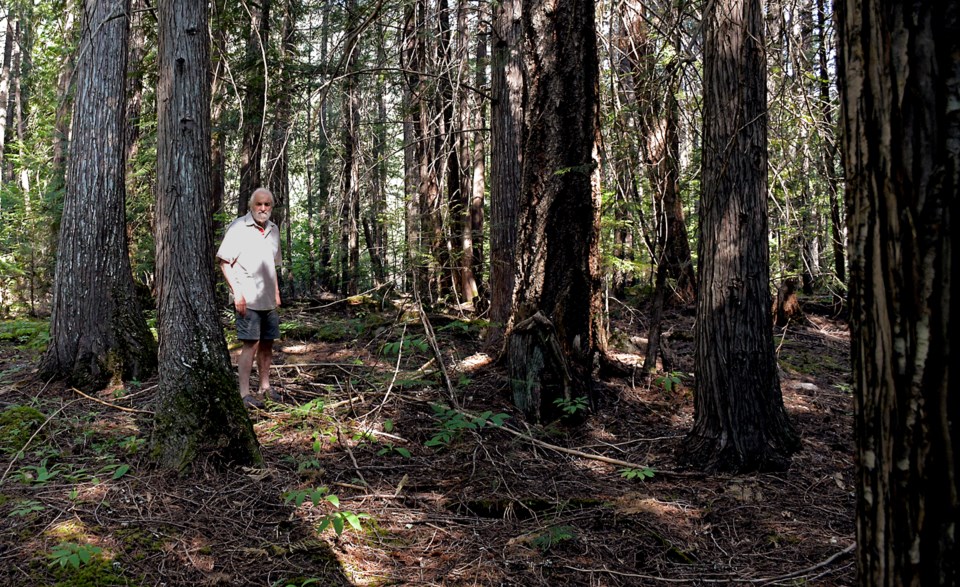As a retired forester, Wim Tewinkel understands the immense ecological value of old-growth forest, an issue that has gained renewed attention through the ongoing blockades at Fairy Creek.
“I’m quite aware of the old-growth situation and care about the reduction of low-elevation old growth throughout the province,” Tewinkel said.
So, as he gets further into his golden years, and with no children, Tewinkel has committed to ensuring his 16-hectare property, about 25 kilometres north of Pemberton, remains protected for its ecological value for generations to come.
“There’s a lot of variation. There’s now a beautiful forest with good-sized trees,” he said of the valley-bottom land. “They wouldn’t be old growth, but you wait another 50, 100 years, it’s old growth.
“So it’s just a small area that is there and there are other areas where the trees are not as big, but every little part helps.”
Tewinkel is among a healthy number of private landlowners looking to leave an environmental legacy after they’re gone. While she didn’t have specific stats on-hand, Hillary Page, the B.C. region director of conservation for Nature Conservancy of Canada (NCC), said the past few years have seen heightened interest from private property owners like Tewinkel.
“We do see people wanting to settle their affairs and leave a legacy that keeps the conservation value intact on their land in perpetuity,” she explained. “I don’t know if I can call it officially an uptick, but we do see it a lot.”
Just last week, the NCC announced it had acquired 111 hectares of forest and wetlands near Gates Creek, the result of a partnership between BC Hydro, the province, Fisheries and Oceans Canada, First Nations and public stakeholders that aims to conserve and enhance watersheds that were impacted by BC Hydro dams.
Last fall, the national non-profit acquired an 87-hectare parcel of land on Pemberton Meadows Road, along the Ryan River, that it purchased from a private owner. The riverfront property, believed to be the largest intact parcel of private valley-bottom land in Pemberton, is a key grizzly-bear corridor and is protected from future development.
Page said that such acquisitions often come with a knock-on effect in the area, as other landowners consider the future of their property.
“The Fraser West Natural Area where the Gates Creek and Ryan River properties are, those are two of our newest projects in the area, and [Fraser West] is our newest designated natural area, so we’re just starting to work there over the last three years,” she said. “We have noticed more inquiries and we’re developing partnerships, so I think we will see an increase in securement activity there in the future.”
The NCC takes into account several criteria when considering a land parcel, primarily its ecological and wildlife value, its size, and its proximity to other protected areas. The non-profit also has to weigh the financial implications, even if a piece of land is donated outright from the owner.
“We raise funds for what’s called a property stewardship endowment, so in the case of Gates Creek, it was a donation, but we have to fundraise about 20 per cent of the value to invest … so there’s always funds available for long-term stewardship in perpetuity,” Page noted.
Other non-profits, such as the Nature Trust of BC and Ducks Unlimited Canada, help facilitate the acquisition of private land for protection, while a federal program called Ecological Gifts offers Canadians looking to donate environmentally sensitive land to a qualified recipient significant tax benefits. Since the program began in 1995, 1,610 ecological gifts valued at more than $977 million have been donated across the country, protecting more than 211,000 ha. of wildlife habitat.
“That’s an avenue I definitely would explore,” said Tewinkel of the possibility of protecting his land through a nature conservancy.
“From my point of view and because I’m a forester, I’m used to looking at it this way: just leave it. One hundred, 200 years, because we’re going to need the old-growth forest there.”





